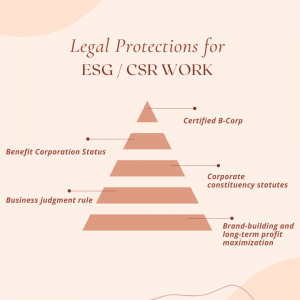Part 2: Fiduciary Duties to Shareholders, Partners, and Members
14 If a business owes a fiduciary duty to create profits, how can it engage in ESG/CSR?
If a business owes a fiduciary duty to make profits, such as a corporation to its shareholders, how can it legally engage in CSR or ESG work?[1] That is, if from a legal perspective a company must make money, how can it worry about the environment, or diversity, or cleaning up trash in local communities, or any of the thousand other “extracurricular” activities businesses regularly engage in?
We will revisit this question several times throughout the text. The first part of the answer is that ESG / CSR work may strengthen the ability of the company to make long-term profits. The basic premise is this: consumers often care about ESG / CSR issues. This is why you see environmental certification labels on food, “free from child labor” notes on clothing, corporations sponsoring community programs, and so on. By engaging in these activities, the company hopes to build consumer loyalty, improve the image of the brand, and so on.
Long-term brand building forms the bottom of the “Legal Protections for ESG / CSR” pyramid below. We will visit the other elements of this pyramid later in this Part. These build on each other and provide multi-layered protections for businesses who attempt to engage in ESG / CSR behavior.

If a shareholder believed that engaging in this behavior was wasting corporate resources, in most cases the business judgment rule (which we will study soon), will protect the decision so long as there is at least a small relationship between the activity and brand-building, customer loyalty, or other profit-making activities. If the shareholder disagrees, they can always attempt to remove the directors who approved the activity and vote for replacements.

Exercises
- For the company you have been considering, what kind of charitable work does it engage in, if any? Does this strengthen your view of the brand, in practice?
- We will often use corporations as the example in the text, but similar principles would apply to any business organization that owes a duty to make profits to another. ↵

